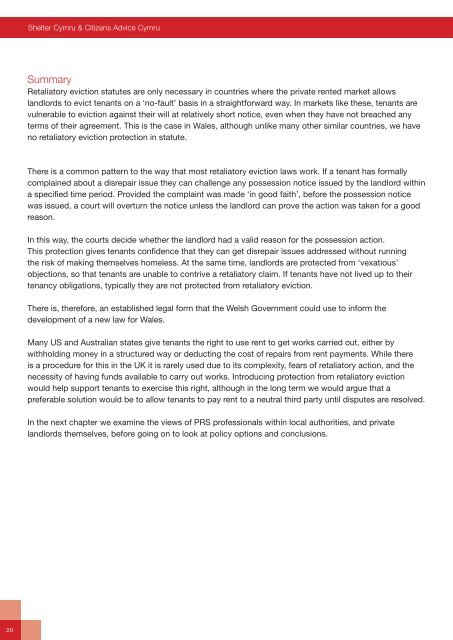Retaliatory eviction - Citizens Advice
Retaliatory eviction - Citizens Advice
Retaliatory eviction - Citizens Advice
You also want an ePaper? Increase the reach of your titles
YUMPU automatically turns print PDFs into web optimized ePapers that Google loves.
Shelter Cymru & <strong>Citizens</strong> <strong>Advice</strong> CymruMaking rights real: preventing retaliatory <strong>eviction</strong>s in WalesSummary<strong>Retaliatory</strong> <strong>eviction</strong> statutes are only necessary in countries where the private rented market allowslandlords to evict tenants on a ‘no-fault’ basis in a straightforward way. In markets like these, tenants arevulnerable to <strong>eviction</strong> against their will at relatively short notice, even when they have not breached anyterms of their agreement. This is the case in Wales, although unlike many other similar countries, we haveno retaliatory <strong>eviction</strong> protection in statute.There is a common pattern to the way that most retaliatory <strong>eviction</strong> laws work. If a tenant has formallycomplained about a disrepair issue they can challenge any possession notice issued by the landlord withina specified time period. Provided the complaint was made ‘in good faith’, before the possession noticewas issued, a court will overturn the notice unless the landlord can prove the action was taken for a goodreason.In this way, the courts decide whether the landlord had a valid reason for the possession action.This protection gives tenants confidence that they can get disrepair issues addressed without runningthe risk of making themselves homeless. At the same time, landlords are protected from ‘vexatious’objections, so that tenants are unable to contrive a retaliatory claim. If tenants have not lived up to theirtenancy obligations, typically they are not protected from retaliatory <strong>eviction</strong>.There is, therefore, an established legal form that the Welsh Government could use to inform thedevelopment of a new law for Wales.Many US and Australian states give tenants the right to use rent to get works carried out, either bywithholding money in a structured way or deducting the cost of repairs from rent payments. While thereis a procedure for this in the UK it is rarely used due to its complexity, fears of retaliatory action, and thenecessity of having funds available to carry out works. Introducing protection from retaliatory <strong>eviction</strong>would help support tenants to exercise this right, although in the long term we would argue that apreferable solution would be to allow tenants to pay rent to a neutral third party until disputes are resolved.In the next chapter we examine the views of PRS professionals within local authorities, and privatelandlords themselves, before going on to look at policy options and conclusions.20




![Annual review [ 1.4 MB] - Citizens Advice](https://img.yumpu.com/50679529/1/190x135/annual-review-14-mb-citizens-advice.jpg?quality=85)

![Help for helping your residents [ 2.4 MB] - Citizens Advice](https://img.yumpu.com/48848542/1/185x260/help-for-helping-your-residents-24-mb-citizens-advice.jpg?quality=85)







